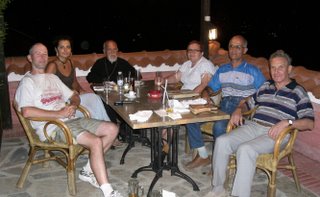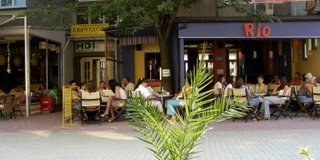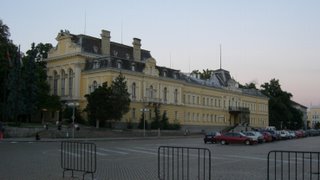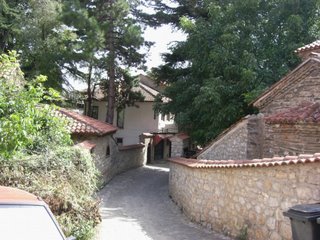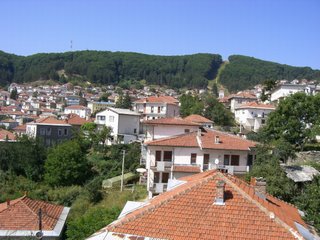Another Day in Kazanlak (26-Aug-2006)
Not that I knew it before I got here, but it turns out Kazanlak is famous for a Thracian tomb, discovered just before the end of WWII while some locals were digging into a hill to make a bombshelter. This was where my Esperanto hosts took me today. I even had a guided tour through the tomb - in Esperanto. I was taken through the tomb and everything that I was supposed to notice was pointed out to me. Many times better than I'd ever thought any guided tour could be.
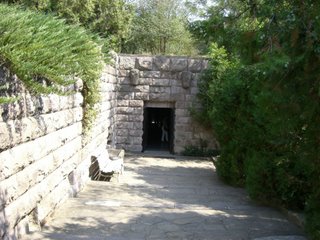
The entrance to the tomb. It's actually quite modern and high-tech just inside the entrance.

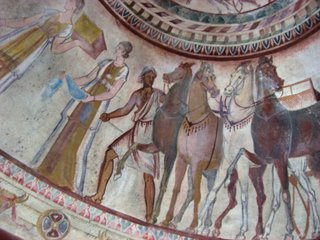
And a couple of snaps of the murals adorning the burial chamber. These were painted in about the 4th century BC. Certainly the best example of this sort of thing in Bulgaria. And apparently some quite remarkable artwork for the period anywhere.
We had a chat with the women selling postcards and entry tickets. They were interested in the fact that I basically had an Esperanto tour-guide. Of course by the time we left I had them saying dankon and gis revido.
Next was the ethnographic museum. Similar to ones I had seen in Macedonia but again the Esperantists pointed out things that I otherwise wouldn't have noticed.
Part of the museum is a merchants house from the 1800's and one can sit up on the balcony overlooking the superb garden and sample some rose liqueur and rose jam. A nice experience. The woman who brought the liqueur up also knew some Esperanto - her father was an Esperantist and her sister is an active Esperantist.

Here's the view of the garden from the balcony as we were enjoying a beautiful day, sipping rose liqueur. Glorious is the word. They knew how to live in the old days. Well, the ones on the balcony did. The peasants slaving away tending the garden probably wouldn't have enjoyed the sun quite so much.
Last stop was the city museum where the woman who showed people the room with the Thracian treasures had also studied Esperanto. Interestingly, these people weren't known to my Esperanto hosts. They just mentioned it because they heard us speaking Esperanto.
Well, I seem to have harped on about the Esperantists a bit, but it's a nice change from having to actually explain what Esperanto is as often happens in Australia.
Looks like the restaurant next to the ethnographic museum has rooms for about $20 per night. I might check into there for my last night here tomorrow.

The entrance to the tomb. It's actually quite modern and high-tech just inside the entrance.


And a couple of snaps of the murals adorning the burial chamber. These were painted in about the 4th century BC. Certainly the best example of this sort of thing in Bulgaria. And apparently some quite remarkable artwork for the period anywhere.
We had a chat with the women selling postcards and entry tickets. They were interested in the fact that I basically had an Esperanto tour-guide. Of course by the time we left I had them saying dankon and gis revido.
Next was the ethnographic museum. Similar to ones I had seen in Macedonia but again the Esperantists pointed out things that I otherwise wouldn't have noticed.
Part of the museum is a merchants house from the 1800's and one can sit up on the balcony overlooking the superb garden and sample some rose liqueur and rose jam. A nice experience. The woman who brought the liqueur up also knew some Esperanto - her father was an Esperantist and her sister is an active Esperantist.

Here's the view of the garden from the balcony as we were enjoying a beautiful day, sipping rose liqueur. Glorious is the word. They knew how to live in the old days. Well, the ones on the balcony did. The peasants slaving away tending the garden probably wouldn't have enjoyed the sun quite so much.
Last stop was the city museum where the woman who showed people the room with the Thracian treasures had also studied Esperanto. Interestingly, these people weren't known to my Esperanto hosts. They just mentioned it because they heard us speaking Esperanto.
Well, I seem to have harped on about the Esperantists a bit, but it's a nice change from having to actually explain what Esperanto is as often happens in Australia.
Looks like the restaurant next to the ethnographic museum has rooms for about $20 per night. I might check into there for my last night here tomorrow.





